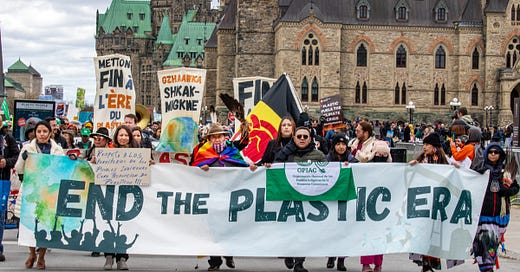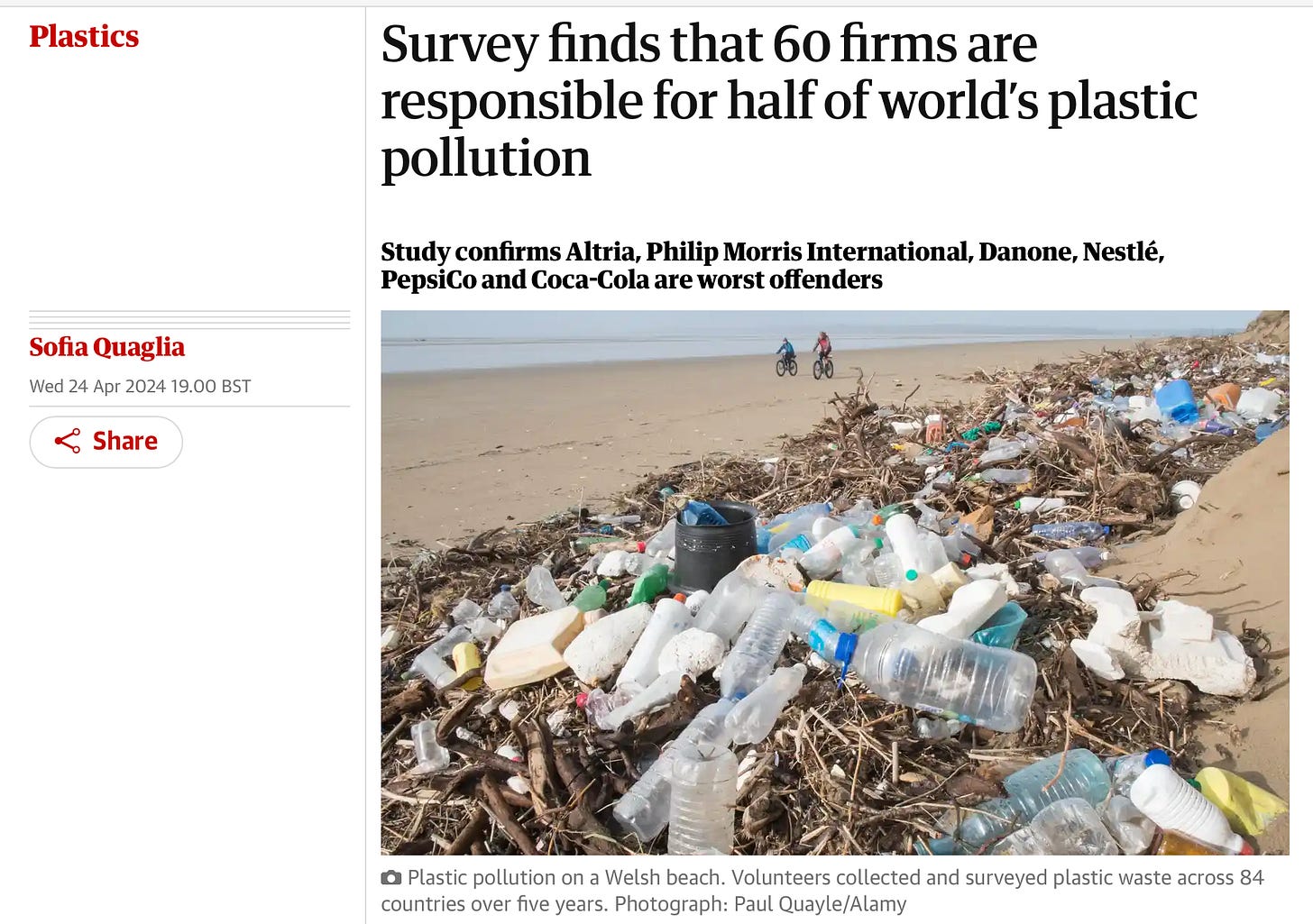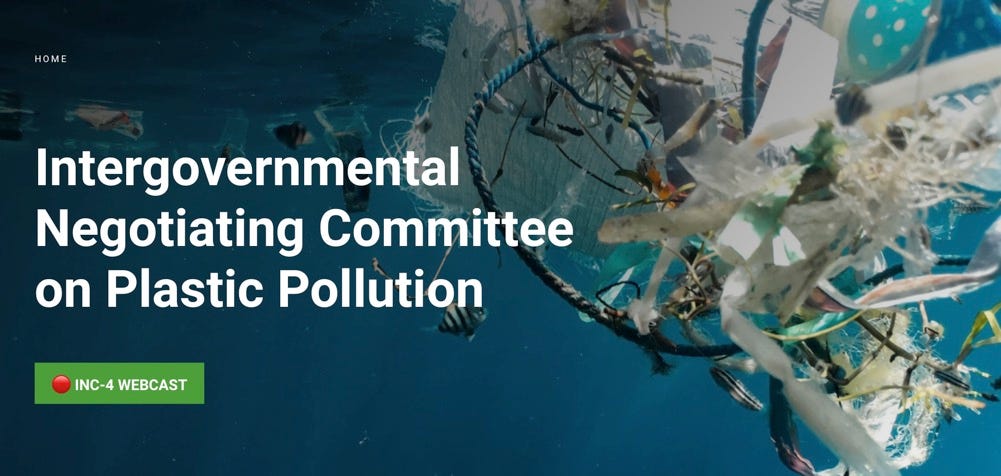Why we will continue to be buried in single-use plastic
It's part of the culture of convenience that drives our economies and a UNEP conference in Ottawa can't stop it.
The Guardian headline looks familiar: “Survey finds that 60 firms are responsible for half of world’s plastic pollution.” The Guardian previously headlined, “Just 57 companies linked to 80% of greenhouse gases since 2016.” and I complained, “Stop blaming 57 companies for greenhouse gas emissions and look in the mirror” with the subhead “It's us, not them. We have to stop buying what they are selling.”
Following the logic of my previous post (which attracted 107 comments, mostly calling me an idiot for blaming the victim) I should now be writing about how it is our fault, and we should just stop buying products in single-use packaging. But there are a couple of reasons that plastics are different, even though they are petrochemicals, with their feedstocks produced by the same companies that produce fossil fuels.
The issue is particularly relevant right now after thousands of negotiators and lobbyists met in Ottawa for a UNEP conference to “develop an international legally binding instrument on plastic pollution.” They didn’t. They couldn’t come to an agreement about how much virgin plastic should be produced or whether there should be any limits on production at all.
I winced when I read that the US delegation wanted to work on reducing demand rather than addressing supply—that’s what I always say! But Carroll Muffett, the president of CIEL, said of the Americans: “When the world’s biggest exporter of oil and gas, and one of the biggest architects of the plastic expansion, says that it will ignore plastic production at the expense of the health, rights and lives of its own people, the world listens.”
So they punted. UNEP executive director Inger Andersen said in the press release that the road is cleared for the next meeting in Busan.
“The work, however, is far from over. The plastic pollution crisis continues to engulf the world and we have just a few months left before the end of year deadline agreed upon in 2022. I urge members to show continued commitment and flexibility to achieve maximum ambition.”
Having recently participated at a UNEP conference in Paris, I have an idea of how these things work; the most important stuff happens in the back rooms where the parties hammer out wording for the agreement. The draft text (PDF here) lists options that will be voted on at the next conference after endless negotiations in the next few months. It is often torture to read, with so many options and bracketed phrases and sentences. There is a reason for this; each set of brackets is a fight or a disagreement among the parties, something yet to be resolved.
Here is an example of the kind of options that have been proposed, without a lot of brackets.
Option 5 is straightforward and wide-ranging. Option 6 could have been written by an oil company pushing recycling, and their phoney hijacked circular economy. Option 7 is a get-out-of-jail-free card letting everyone do whatever they want. I suspect that the end result will be closest to 6, with the “national realities” winning the day. But this is how it’s done; with brackets and options. According to the Plastic Pollution Coalition:
“Although there was progress on substantial negotiations in Ottawa, countries are walking away with a text that is not yet fit for final negotiations in Busan. While there has been some streamlining of the draft, there have also been more additions than deletions, leading to a text riddled with a large number of options and bracketed words and sentences (i.e language not yet agreed upon). A small number of countries continued their obstructionist and low-ambition tactics—watering down, adding countless brackets, and shamelessly twisting the language across the different provisions in an attempt to narrow the scope and lower the ambitions of the treaty.”
Which brings us back to the Guardian headline and the study, Global Producer Responsibility for Plastic Pollution, and why I take a different stance with plastics than I did with oil and blame the producers this time. With oil, we were dealing with national entities and countries rather than investor-owned companies; complaining about them wasn’t going to make much of a difference. They are definitely a factor here, but they are not alone.
With plastics, the purchasers of the petrochemicals are corporations with shareholders, buying it and turning it into consumer products. We can make our voices heard, and we also have more options. According to the study, the Coca-Cola company is the largest single identified producer of plastic litter at 11%. (50% of plastic waste is unbranded and identifiable.) It’s a product with no real utility or benefit that exists because of endless marketing.
It’s a product that used to come in refillable glass bottles that the company knew were better environmentally; they even touted this on the first Earth Day with this ad. It described their returnable bottles as "the answer to an ecologist's prayer," noting that each one made about 50 round trips, and "that means fifty less chances to add to the world's litter problems."
But as I wrote in Treehugger, they did everything they could to kill returnable bottles so they could centralize production and close all those labour-intensive local bottling companies around the country. They took a very efficient circular system and turned it into a linear "take-make-waste" one that was much more profitable, thanks to subsidized highways for transport, cheap gas, and taxpayer-supported waste pickup and recycling.
Coke didn’t need me to blame the victim; they loudly did it themselves. The president of Coca-Cola Europe told Plastic News:
I really believe strongly we don’t have a packaging problem. We have a waste problem and a litter problem. There is nothing wrong with packaging, as long as we get that packaging back, we recycle it and then we reuse it again. Packaging per se is not the problem. It’s the packaging that ends up in landfill or in litter. That sounds jarring when you first hear it and I am not denying there is a packaging waste problem – but it is not necessarily the material.
Coke’s head of PR said we asked for this. "Business won't be in business if we don't accommodate consumers." But they have spent 50 years since that ecology bottle ad making it harder and harder to accommodate customers who don't want disposable bottles. They weren't trying to accommodate customers; they were trying to train them, first to buy single-use bottles, then to not throw them out the car window, and then how to separate them into little piles and recycle them, never taking any responsibility for creating this mess.
And then they have the gall to say, "We don’t have a packaging problem. We have a waste problem and a litter problem." I am sorry, but they made this bed.
It’s not just Coca-Cola, though. Unilever is burying Africa in single-use sachets with small quantities of shampoo, toothpaste or other products. According to Gaia,
“Sachets are widely perceived as affordable, convenient, and indispensable, but only because their true costs are externalised, unaccounted for by corporations that have profited handsomely from the sachet economy, and disproportionately paid for by society.”
Single-use plastics may start with fossil fuels, but they end up in every part of our economy, from the tiniest roadside stand in Kenya to the biggest Walmart. This is why so many lobbyists showed up in Ottawa; they are not only oil and chemical companies, but food and beverage companies. According to Delphine Lévi Alvarès of the Center for International Environmental Law (Ciel), quoted in the Guardian:
“Lobbyists are appearing on country delegations and are gaining privileged access to member-state-only sessions, where sensitive discussions unfold behind closed doors. Beyond the troubling number of lobbyists present at the negotiation talks, behind-the-scenes industry lobbying activities and events take place around the world in the months leading up to negotiations.”
They will keep at it in the months to come before Busan. And they are persuasive; Elizabeth Royte wrote in her book Bottlemania:
...as one Pepsico marketing VP said to investors in 2000, "When we are done, tap water will be relegated to showers and washing dishes."
They did it. The petrochemical, packaging and bottling companies have been incredibly successful in marketing single-use products like bottled water that we never needed in the first place. They have created this culture of convenience that is burying us in plastic. They turned recycling into a religion. They hijacked the circular economy.
That’s why we have to fight back with our protests at the UNEP conferences supporting limits on the supply of plastics, with our votes for parties that support bans on single-use plastics, and with our wallets by refusing to buy them. As the wonderful Hubert Rogers poster from the Canadian Wartime Information Board said, We have to attack on all fronts.
I did a post of my lecture to my students at Toronto Metropolitan University about this: How Design for Disposability and Convenience Will Bury Us in Waste. And if you want to watch:













>>” That’s why we have to fight back with our protests at the UNEP conferences supporting limits on the supply of plastics, with our votes for parties THAT SUPPORT BANS ON SINGLE-USE PLASTICS (emphasis added), and with our wallets by refusing to buy them.”
As I see it, the only reason why calls exist for a ban on single-use plastics (SUP’s) is because you already know that people will refuse to comply with the idea of eschewing them voluntarily—because if people would avoid SUP’s on their own, there would be no need for coercive force by government fiat.
In other words, your messaging has been a failure since the 1970’s heyday of Earth Day awareness campaigns and you now need to resort to having government control our lives. So what else can we expect from the government to force us to do? Accept a centralized bank digital currency that will allow the government to control everything we do under penalty of losing access to our own money?
Oh wait, that just happened in the EU. No wonder average people there are pissed and moving further to the right politically.
I despair when I go to the market and find so many things in plastic packaging. I don't know how to buy my food without ending up bringing disposable plastic home. It is impossible to buy strawberries that are not packed in plastic boxes. Plastic jars far outnumber glass jars for basic pantry items.
I think that a lot of victim blaming is going on. Don't the big-shots that are getting rich off of petroleum products understand that we only have one earth? I fear that they just don't care and are kicking the can down the road because they are comfortable for now, they are not considering the future of their children and our planet.